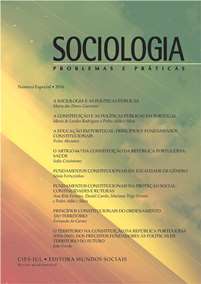Fundamentos constitucionais da proteção social: continuidades e ruturas
DOI:
https://doi.org/10.7458/SPP2016NE10351Resumo
Neste artigo discutimos de que forma a Constituição da República Portuguesa enformou as escolhas políticas presentes na definição do estado social democrático e de que modo os princípios constitucionais se fazem refletir na arquitetura do sistema e se foram alterando ao longo do tempo. Argumentamos que, aquando da transição para a democracia, ao contrário de outras áreas de políticas sociais, a segurança social manteve princípios organizadores anteriores. Contudo, esta resiliência da matriz bismarckiana do sistema português não foi impeditiva da expansão da proteção social portuguesa de acordo com princípios universais e concedeu aos sucessivos governos margem de manobra para definirem políticas programaticamente distintas e implementarem estratégias reformistas diferenciadas. Concluímos argumentando que, se bem que a Constituição não tenha sido um limite intransponível para a ação política dos executivos, esta tem operado de facto como um ponto de veto, nomeadamente pela forma como o Tribunal Constitucional tem defendido o direito à proteção social, seja numa lógica de seguro social, seja na sua vertente de mínimos sociais.Downloads
Publicado
2016-12-02
Edição
Secção
Artigos
Licença
Autores que publicam nesta revista concordam com os seguintes termos:
a. Autores conservam os direitos de autor e concedem à revista o direito de primeira publicação, com o trabalho simultaneamente licenciado sob a Licença Creative Commons Attribution que permite a partilha do trabalho com reconhecimento da autoria e publicação inicial nesta revista.
b. Autores têm autorização para assumir contratos adicionais separadamente, para distribuição não-exclusiva da versão do trabalho publicada nesta revista (ex.: publicar em repositório institucional ou como capítulo de livro), com reconhecimento de autoria e publicação inicial nesta revista.



